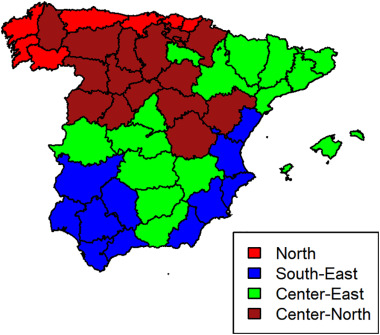Environment International ( IF 10.3 ) Pub Date : 2018-10-10 , DOI: 10.1016/j.envint.2018.10.003 Clara Morral-Puigmal , Èrica Martínez-Solanas , Cristina M. Villanueva , Xavier Basagaña

|
Background
A few studies in high-income countries have investigated the relationship between ambient temperature and/or precipitation and the occurrence of gastroenteritis. In most of the cases, hot temperatures and heavy precipitation events have been related to increases in infections. This is of concern as climate change predictions indicate an increase of those extreme events. Our aim was to evaluate the association between meteorological variables and daily gastroenteritis hospitalizations in Spain for the period 1997–2013.
Methods
We obtained data on all hospitalizations which occurred in Spain for the study period from administrative databases and selected those with gastroenteritis as the main diagnosis. Meteorological data was obtained from the European Climate Assessment & Dataset. Daily counts of hospitalizations were linked to meteorological variables in a retrospective ecological time series study using quasi-Poisson regression models with overdispersion and applying the Distributed Lag Non-linear Model (DLNM) framework.
Results
Both high and cold temperatures increased the risk of gastroenteritis hospitalizations (relative risk (RR) = 1.21, 95% confidence interval (CI): 1.09, 1.34; and RR = 1.07, 95% CI: 1.00, 1.15, respectively), whereas heavy precipitation was found protective for those hospitalizations (RR = 0.74, 95% CI: 0.63, 0.86). Hot temperatures increased hospitalizations for gastroenteritis classified as foodborne or idiopathic but not those in the group of Others, which were composed mainly of infections by rotavirus and were associated with cold temperatures.
Conclusions
Our findings suggest an important role of ambient temperatures, especially hot temperatures, in increasing gastroenteritis hospitalizations, while the exposure to heavy precipitation events pose opposite and unexpected effects on these infections.
中文翻译:

西班牙的天气和胃肠道疾病:回顾性时间序列回归研究
背景
高收入国家的一些研究调查了环境温度和/或降水与胃肠炎的发生之间的关系。在大多数情况下,高温和强降水事件与感染增加有关。这是令人担忧的,因为气候变化预测表明这些极端事件有所增加。我们的目的是牛逼Ø评估期间1997-2013西班牙气象变量和日常胃肠炎住院之间的关联。
方法
我们从行政数据库中获得了本研究期间西班牙发生的所有住院治疗的数据,并选择了以肠胃炎为主要诊断的住院治疗。气象数据来自欧洲气候评估与数据集。在回顾性生态时间序列研究中,使用准泊松回归模型(具有过度分散性)并应用分布式滞后非线性模型(DLNM)框架,将住院的每日计数与气象变量相关联。
结果
高温和低温都增加了胃肠炎住院的风险(相对风险(RR)= 1.21,95%置信区间(CI):1.09,1.34; RR = 1.07,95%CI:1.00,1.15)发现降水对这些住院有保护作用(RR = 0.74,95%CI:0.63,0.86)。高温增加了归类为食源性或特发性的胃肠炎的住院治疗,而其他组则没有,这主要由轮状病毒感染构成,并与低温相关。
结论
我们的发现表明,环境温度(尤其是高温)在增加肠胃炎住院治疗中起着重要作用,而暴露于大量降水事件则对这些感染产生了相反且出乎意料的影响。











































 京公网安备 11010802027423号
京公网安备 11010802027423号